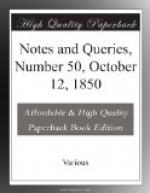A READER.
[We are indebted to the courtesy
of the Editor of the Liverpool
Albion for this Reply,
which was originally communicated to
that paper.]
The Curfew, of which some inquiries have appeared in the “NOTES AND QUERIES,” is generally rung in the north of England. But then it is also common in the south of Scotland. I have heard it in Kelso, and other towns in Roxburghshire. The latter circumstance would appear to prove that it cannot have originated with the Norman conqueror, to whom it is attributed.
W.
* * * * *
ENGELMANNS BIBLIOTHECA SCRIPTORUM CLASSICORUM.
(Vol. ii., p. 296.)
The shortest reply to MR. DE MORGAN’S complaint against a foreign bookseller would be, that Engelmann himself printed for any of the purchasers of a large number of his Catalogues the titles to which MR. DE MORGAN objects so much.
Will you allow me to add one or two remarks occasioned by MR. DE MORGAN’S strictures?
1. Engelmann is not, strictly speaking, a bookseller, and his catalogues are not booksellers’ catalogues in the sense in which that term is generally received here. He is a publisher and compiler (and an admirable one) of general classified catalogues for the use of the trade and of students, without any reference to his stock, or, in many instances, to the possibility of easily acquiring copies of the books enumerated: and although he might execute an order from his catalogues, getting orders is not the end for which he publishes them.
2. Some foreign houses in London, as well as in other countries, bought a large number of his Catalogues, not as a book but as a catalogue, to be supplied to their customers at the bare cost, or, where it appears advisable, to be delivered gratis to purchasers of a certain amount.
3. It appears to me pardonable if, under these circumstances, a notice is inserted on the title, that orders may be directed to the house which has purchased a number, and supplies them without any immediate profit; and I may add that I do {313} not believe any of the houses concerned would object to a notice being taken of such a proceeding in your paper.
4. The error in omitting the words “from 1700” on the title-page, is one to which MR. DE MORGAN’S notice first directed my attention, classics printed before that date not being commonly in demand among foreign booksellers.
5. The practice of compiling catalogues for general use, with the names of the purchasers of any number of copies of the catalogue inserted on the title or wrapper, is very common in Germany.
Hinrichs of Leipsic issues—
1. A Six-monthly Alphabetical Catalogue, with a systematic index;
2. A Quarterly Catalogue, systematically arranged, with an alphabetical index;
Vandenhoeck of Gottigen issues half-yearly—




